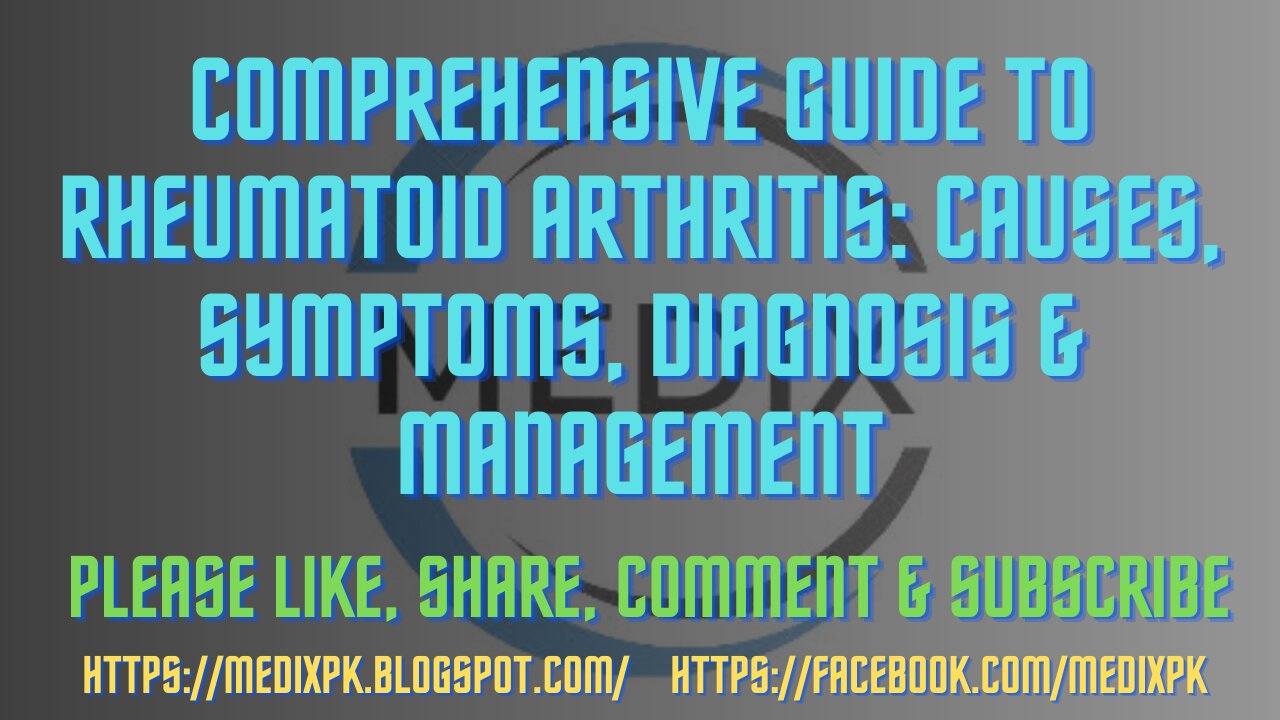Premium Only Content

Comprehensive Guide to Rheumatoid Arthritis: Causes, Symptoms, Diagnosis & Management
Introduction:
Rheumatoid Arthritis (RA) is a complex autoimmune disorder that affects millions worldwide. In this comprehensive guide, we will delve into the intricacies of RA, exploring its causes, symptoms, diagnosis, and various management strategies. Whether you're someone living with RA or seeking to expand your knowledge, this blog serves as an invaluable resource to help you navigate the challenges posed by this condition.
Understanding Rheumatoid Arthritis:
Rheumatoid Arthritis is more than just joint pain; it's an autoimmune disease that involves the body's immune system attacking its own healthy tissues. This results in inflammation, particularly in the joints, but can also affect organs and overall well-being. It's essential to differentiate RA from other types of arthritis, as its underlying mechanisms and treatments vary.
Unraveling the Causes and Risk Factors:
RA is influenced by a combination of factors, including genetics, environmental triggers, and lifestyle choices. Genetic predisposition plays a significant role, with certain genes increasing susceptibility to the condition. Environmental factors, such as smoking and exposure to pollutants, can also contribute. Understanding these factors can help individuals take proactive steps to mitigate risks.
Decoding Common Symptoms and Their Impact:
The hallmark symptoms of RA include joint pain, swelling, stiffness, and fatigue. These symptoms can impact daily life, making tasks that were once routine more challenging. Learning to recognize and manage these symptoms is crucial for maintaining quality of life and preventing joint damage.
Diagnosing RA:
Accurate diagnosis of RA is key to effective management. Healthcare providers use a combination of clinical evaluation, blood tests measuring rheumatoid factor and anti-cyclic citrullinated peptide (anti-CCP) antibodies, and imaging techniques such as X-rays and MRI scans. The American College of Rheumatology's criteria aids in diagnosing RA and distinguishing it from other conditions.
A Multifaceted Approach to Treatment:
Managing RA involves a multi-pronged approach tailored to each individual. Disease-modifying antirheumatic drugs (DMARDs), biologic agents, pain relievers, and corticosteroids are commonly used to manage inflammation and slow disease progression. Physical therapy and occupational therapy help maintain joint function, while lifestyle changes like exercise and diet modifications can complement medical treatments.
Strategies for Disease Management:
Incorporating effective strategies into daily life is essential for managing RA. Regular exercise, such as low-impact activities and range-of-motion exercises, can help maintain joint flexibility. A balanced diet rich in anti-inflammatory foods can alleviate symptoms. Additionally, stress management and emotional well-being play a role in overall RA management.
Navigating Potential Complications:
RA can lead to complications beyond joint pain. Long-term inflammation can affect organs like the heart and lungs, increasing the risk of cardiovascular disease. Mental health challenges are also prevalent among individuals with chronic conditions. Being aware of these potential complications allows individuals to work closely with healthcare providers to address them.
Conclusion:
By understanding Rheumatoid Arthritis on a deeper level, individuals can better advocate for their own health and make informed decisions about their treatment journey. Knowledge is a powerful tool, and this comprehensive guide provides insights into the causes, symptoms, diagnosis, and management of RA. Remember, consulting a healthcare professional is essential for personalized guidance and optimal care.
Spread awareness by sharing this blog and joining the conversation about Rheumatoid Arthritis. Together, we can foster a supportive community and empower individuals to live well with this challenging condition.
-
 1:19:18
1:19:18
Game On!
16 hours ago $1.95 earnedJoe Burrow Redemption Season! Bengals 2025 Preview!
41.9K2 -
 14:42
14:42
Michael Button
18 hours ago $3.90 earnedThis Discovery Rewrites Human History Forever
41.4K18 -
 28:22
28:22
World2Briggs
19 hours ago $2.68 earned10 European Cities Practically Begging Retirees to Move In
26.8K7 -
 2:01:32
2:01:32
BEK TV
1 day agoTrent Loos in the Morning - 8/05/2025
20.3K1 -
 15:03
15:03
AndresRestart
18 hours ago $1.22 earnedNintendo Alleviates Concerns & Hints At Metroid Prime 4's Release Date!
26.6K3 -
 18:29
18:29
Fit'n Fire
1 day ago $3.41 earnedThe Auto Rifle Everyone Needs
25.7K7 -
 16:28
16:28
Sugar Spun Run
1 day ago $1.16 earnedTiramisu Cake
20.3K5 -
 1:01:48
1:01:48
Dialogue works
1 day ago $5.19 earnedAndrei Martyanov: Trump Left Hanging - Russia's Cold Silence Sends a Message
60.5K15 -
 2:39:14
2:39:14
FreshandFit
14 hours agoOnlyFans Clout Chasers Said This And Got Kicked Off...
363K169 -
 2:12:28
2:12:28
Badlands Media
19 hours agoBaseless Conspiracies Ep. 144: NATO Narratives, Media Meltdowns & a Brightcore Boost with Kim Bright
139K37